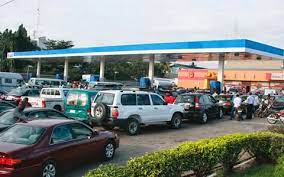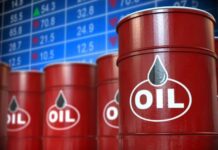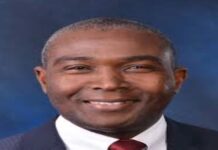Commercial bus operators on Tuesday hiked their fares on various routes in Lagos State due to the lingering scarcity of Premium Motor Spirit (PMS), also known as petrol in the state.
A News Agency of Nigeria (NAN) correspondent who monitored the situation reported that the fares were increased by between N100 to N150, depending on the route.
It was observed that buses were carrying passengers from Iyana-Ipaja to Oshodi for N400 against the normal N300 while bus fare from Iyana-Ipaja to Ikeja increased from N200 to N300.
Similarly, commuters going from Berger to Ojuelegba were charged N400 instead of the usual N300 while passengers from Berger to CMS had to pay N800 instead of N600.
Also, the bus fare from Ketu to Constain went up from N300 to N400, leaving many passengers frustrated and stranded especially with the few available buses on the road.
A teacher, Mr. Thomas Ayeni, told NAN that the increment had doubled his daily transportation expenses.
Ayeni said: ”I am spending double of the amount I normally spent on transport and it is not easy with the way the economy is going.
“I am appealing to the government to intervene quickly to ensure that there is fuel everywhere to reduce this suffering.
Also, a trader, Uche Ikeagwu said he normally paid N600 from Iyana-Ipaja to Idumota but that the fare had increased to N800.
He said,” We are three at the shop and this means I have to pay N2,400 for us to get to the shop. I don’t know how we can continue to do business like this.”
However, Mr. Akeem Balogun, Secretary, Independent Petroleum Marketers Association of Nigeria (IPMAN) Lagos Satellite Depot, Ejigbo, advised marketers against exploiting customers due to the scarcity.
Balogun said: “Most of them are stocked out and they are going to look for product now. What we told them is to sell as reasonable as possible. They should not exploit the public.
“We have explained our predicament with the current price of PMS at private depots. We explained that with the current price, there is no way we can sell less than N180 per litre.
“That is why some of our members have shut down their stations because it is not sustainable for them to continue to sell petrol at N165 per litre.”
Meanwhile, the scarcity of fuel in Lagos and Ogun states worsened Tuesday as the federal government and marketers disagreed over the cost of Premium Motor Spirit (PMS) also known as petrol.
While government insisted on official pump price of N165 per litre as stipulated in the petroleum product pricing template, depot operators said the rising cost of purchase does not guarantee the product should be sold at present price.
The government cautioned Nigerians against panic buying of petrol, stressing that the Nigeria currently had over two billion litres of PMS in various depots.
The Nigerian Midstream and Downstream Petroleum Regulatory Authority, the Nigerian National Petroleum Company Ltd and the Pipelines and Products Marketing Company insisted that current pump price must not be altered after their visit to jetties in Apapa, Lagos on Tuesday.
The depots visited by the top officials of the agencies were NIPCO Depot and Total Energies Depot.
Executive Director, Distribution Systems, Storage and Retail Infrastructure, NMDPRA, Mr Ugbugo Ukoha, said that petrol was a regulated product and urged marketers to comply with the pricing template.
Ukoha said the war between Russia and Ukraine had resulted in rise in the cost of Automotive Gas Oil (diesel) which was a critical product used in transporting petroleum products from the depots to the retail outlets.
He said: “So, when we observed that this poses a big challenge in the movement of other products, we made the representation to the Minister of State for Petroleum and Mr. President graciously approved that the freight rate for trucks be increased.
“There’s a N10 addition which we will apply to the different routes to enable trucks move to docks easily with less burden.
“With these kinds of efforts from government, we can only continue to appeal to operators within this industry to play by the rules.
“PMS is a regulated product and the prices are fixed. The ex-depot price is known. The pump price remains N165 and the authority is ever ready to enforce those rules. So, we will continue to urge Nigerians to keep within these operating rules.“
He said the focus of the stakeholders in the next few days would be to close the supply gaps and resolve the ongoing scarcity of petrol as soon as possible.
Similarly, Mr Adetunji Adeyemi, Group Executive Director, Downstream, NNPC Ltd. said the purpose of the visit to the depots was to get first hand information on the challenges responsible for the current scarcity.
He said despite the challenges globally in terms of the supply chain, NNPC had continued to provide petroleum products, specifically PMS to Nigerians.
“Today we have about two billion litres of PMS in-country which is about 34 days sufficiency. So, there is sufficient petrol in the country.
“We are working with the entire stakeholders and players in the downstream sector to ensure that this product gets to the distribution channels and also the stations.
“We want Nigerians to continue to enjoy free flow of petroleum products,” he said.
Mr Isiyaku Abdullahi, Managing Director, PPMC, said the company had been supporting transporters and marketers with diesel in form of palliative to ensure the smooth distribution of PMS and ameliorate the suffering of Nigerians.
He said three vessels carrying about 60 metric tons of PMS was currently discharging at the Apapa jetty which would be further transported to Lagos and other parts of the country to restore normalcy to the situation.
On their parts, Mr Suresh Kumar, Managing Director, NIPCO and Mr Ernest Umunna, Site Manager, Total Energies, assured Nigerians of product availability in their depots.
They also promised to carry out 24-hour trucking out operations to ensure that the scarcity situation in Lagos was resolved within the next few days.
Meanwhile, member companies of the Depot and Petroleum Products Marketers’ Association of Nigeria (DAPPMAN), have complained that cost of petroleum products purchase and handling has escalated and eroding their profit margin.
Though the Association empathised with the public, it however blamed the suspension of the Petroleum Industry Act, PIA, implementation for creating hiccups in the system.
In a statement released Monday in Lagos by Olufemi Adebayo Adewole, Executive Secretary, DAPPMAN, the Association regretted the current setback in the distribution and supply of premium motor spirit (petrol) at the various stations dispensing at N165 per litre.
According to Adewole, Nigerians would please note that the on-going Russia-Ukraine War has adversely affected the world, including our dear country Nigeria. Its adverse impact on the international prices of fuel and food supply, have resulted in a corresponding increase in local prices of goods and services.
“The above situation, DAPPMAN noted has had its adverse effects on the operating cost of managing the various petroleum products depots in Nigeria.
“You would note that the petrol we supply, is sourced, solely from NNPC Limited’s marketing subsidiary, Petroleum Products Marketing Company Limited (PPMC) for our onward sale to the public at the regulated price of N165 per litre.
“This purchase from the PPMC is achieved through funds sourced with high bank interest charges, alongside increased costs of hiring vessels utilized in the delivery of fuel cargoes to our depots.
”This is coupled with the intense scarcity of bunker fuel for running these vessels with increase in the cost of diesel used in powering equipment and machineries in our depots and retail outlets.” added the statement.
Adewole said that overtime, depot owners and the government have struggled to sustain supply of petrol at the current pump price of N165 per litre despite the huge subsidy cost to government and abysmal or no profit margins to the depot owners.
He said, “But for its suspension, the implementation of the Petroleum Industry Act 2021 would have provided an ideal enabling environment by creating the free market in which demand and supply would affect fuel pump price.”
The association assured the public that depot owners, working tenaciously in concert with NNPC Limited, through its marketing subsidiary, will continue to ensure availability of products nationwide.
Meanwhile. an illegal tanker and dispenser of petroleum products, located at Central Business District, near a popular hotel in Abuja
The Nigerian Midstream and Downstream Petroleum Regulatory Authority (NMDPRA) in collaboration with the Joint Task Force on Jerrycan Peddlers on Tuesday raided and arrested some illegal petroleum products sellers to sanitize the industry.
The team, during monitoring and enforcement in Abuja, in view of the current fuel scarcity, seized over 1,000 litres of Premium Motor Spirit (PMS) and Automotive Gas Oil (AGO), Diesel from illegal peddlers.























